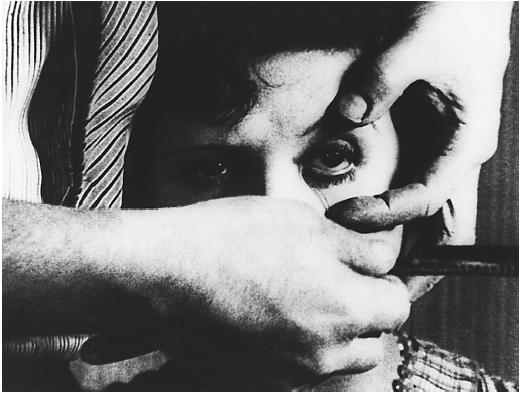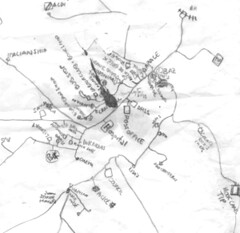SOC Film Festival Wiki Proposal: Image Authority More Habit Forming than Heroin

PROLOGUE
Flashback to the early 70’s. William Burroughs creates “The Electronic Revolution,” a reality check to awaken the human organism from centuries-long symbiosis with the parasitic word virus.
The Word,

a.k.a. LOGOS,

reason,

the Wyrd of God.

For Burroughs, these different names all point to the same ugly beast: Control. ControlControlControlControlControlControlControlControlControlControlControlControlControlControlControlControlControlControlControlControlControlControlControlControlControlControlControlControlControlControlControlControl
"Control"
It inhabits our bodies with
out our permission;
it regulates our relationship to
ourselves and
to the world with
out our awareness.
Worst of all,
control uses us
as mere vessels
to perpetuate control, while we’re left
dependent
and vulnerable
hosts, like dying cells in rotting body, or junkies feeding a compulsive habit.
If we want to save humanity and pursue other evolutionary possibilities, our only hope is to interrupt control, to stop our word-addiction before control monopolizes all life on the planet. Burroughs offers us a wrench to throw in the machine: Electronic recording. Video playback. The written word is an image is a picture. Make the word-image-picture infect the control virus and repurpose the word from copying itself. To be an agent with a recorder is to become God. As Burroughs says, “I effect them. They cannot effect me.”
Fast-forward to the present day. Control has evolved (and Burroughs is spinning in his grave.)

Through time, it spread from oral literature to written literature to image. People are turning away from reading books toward newer technological forms, primarily film, for the consumption of images and narratives that tell us our hopes, dreams, fears, as well as make sense of our past, present, and future. This means that control extended its grasp beyond written words, latching its tentacles around moving pictures to reach us.
With the decline of literature, discourses of control, being viral entities, require a new host with which to infect the most bodies for maximizing self-replication. The exquisite corpse of literature has given way to the comparatively healthy body of video media, which saturates all parts of the world, as the dominant target for breeding and spreading control. Burroughs prophetically stated, “Word is image is virus.” Following this logic, it makes sense that our attention to the written word has been displaced onto the visual language of the cinema, a now-ubiquitous “channel.”
The wake of 9/11, coupled with an administration and news media both deeply in love with control, has fused film and control discourses as if they were two well-suited cells in a Petri dish. Cinematic output from the Right and the Left capitalize on a culture of fear produced by an intensified proliferation of control. For example, the movie adaptation of A Scanner Darkly by Richard Linklater exploits the byproducts of control to construct a mythology of fear for mass consumption. It links the familiar fear of governmental surveillance to the age-old fear of druggies in a new context, re-packaging the virus for consumers who might’ve missed Dick’s story the first time around.
Given this context, it makes perfect sense to address modern-day societies of control by using movies as an entry point.
Film

could

BE
[]
disseminated
(dissected)

(dissected)

(dissected)

(dissected)

in a variety of ways. For example, the rise of Youtube and other online visual mediums would be appealing, due to their popularity and novelty; however, questions of media availability and the very real and problematic tendencies toward controlling content on the part of Youtube affiliates has suggested that alternative mediums may be desirable to account for the evolution and manifestations of control machines with the utmost freedom from external control.
Enter the movie theater. Cinema. Despite Hollywood’s flagging box office profits and the ongoing disappearance of indie/arthouse theaters, movie theaters generally remain a crucial venue for screening and propagating the dominant narratives that shape people’s perceptions of themselves and their relationship to control societies. We might say that Hollywood has a kind of “image authority” over storytelling. Not only is it a global business, but also its aesthetic and narrative formulae have invaded other bodies of art, such as video games. What Hollywood does gets
copied and re-copied by imitators in
all
spheres
of
culture.
Commercial cinema offers us seemingly [self/evident] truths through repeated conventions, structuring our thinking in similarly reductive ways. Just as the word virus makes us submissive to it by inflicting on us repetitious forms of grammar and so on that we internalize and enforce in everyday communication, so too does the image virus
frame our ways of seeing the world

by using and reusing techniques to value things in specific ways that we unconsciously replicate in everyday life.
We want to transform the cinema, to throw a figurative wrench into the control machine that dominates modern life. Up to now, movie outlets have been used as an instrument by the entertainment industry to extract capital and brainwash the masses into leading lives of well-ordered control. We recognize in cinema, as Burroughs realized in language, a capacity for self-deconstruction, if only we press the right buttons. Cutting up movies
and presenting them to the public, we believe, would expose the artifice of cinema and its role in perpetuating control and allow us to rethink our perceptions so that we begin promoting humanity instead of a pre-existing protocol to sustain control.
STRATEGY

So here’s the plan for the project:
1) HIJACK THE REALITY STUDIO. Take over the cinema that transforms life into a third-rate movie. To do so, we take a handful of movies, either exemplars of control or self-conscious reactions to control, and then screen them to the public. A public dissection. The public is whoever wants to participate. After each screening, we address aspects of the films that demonstrate complicity or challenge toward control. We do this to build up a critical toolbox for the public so that they can take our learning from ENGL473 and use it as metaprogramming techniques to remix the movies they consume. Time permitting, we’d also like to provide background on each movie. That way we can
trace the history of labor behind commodities that like to appear natural, without origin.

2) ESTABLISH TAZ. The Electronic Revolution will take place somewhere. We just haven’t decided on where yet. Ideally, we aim to hold a film festival outdoors, specifically at the Center for Sustainability, because the center is a TAZ, Bey’s term for Temporary Autonomous Zone. It’s outside, located away from campus, space-wise capable of holding large numbers of people, and unlike the Carnegie screening room, it hasn’t (yet) fallen victim to bureaucratic control. Like a TAZ, its boundaries haven’t been thoroughly demarcated and enforced yet, so there’s some space to move, explore, and learn without the threat of punishment from outside if we go too far and uncover something truly strange. Quick point about the festival: Despite being a “festival,” it’s not a Bahktinian carnival. Yes, we intend to have some revelry, but our main job is to clarify the link between Societies of Control and the cinema. Therefore, a reaffirmation of the existing social order after the festivities is not on our gameplan.
3) PROPAGANDIZE. Er, we mean advertise. Promotion is a huge part of launching a festival. In our case, promotion will serve multiple functions. Not only will ads display info about the event, but they will also be designed by coco32 and TheBoogieMonster to resemble old war propaganda, parodying the aesthetics of control discourse that tries to influence our lives in the real world.
Propagandistic Film Fest Poster Formula:

+

=

On another level the parody of control hints at our conflicted relationship to resistance to image authority in a postmodern context: If parody and pastiche are the dominant styles of commercial cinema and media advertisers, are we reinforcing their power by poking fun at them with their own language? We’re in the same spot as Burroughs; there’s a man who tried to interrupt control using the language of control. Can we make a difference (on the micro-level)? Time will tell.
4) CULTIVATE “BIO/POWER.” We’re not collecting stats or medical images of bodies in the Foucauldian sense of biopower. We mean, gather power (food) for the body (public) so we all stay alive throughout the ordeal. The festival could last hours. The exact length is TBA once the films, site are secured. Yet we realize that we need grub to shape us up into dedicated metaprogrammers. There’ll be more on this task later, but for now the idea is Jimmy John’s (provided by Toolbox) and possibly a potluck. Having others bring food would contribute to a sense of community and open-source-ness, which is something in short supply these days.
5-99) Other tasks to be added later, or never.

